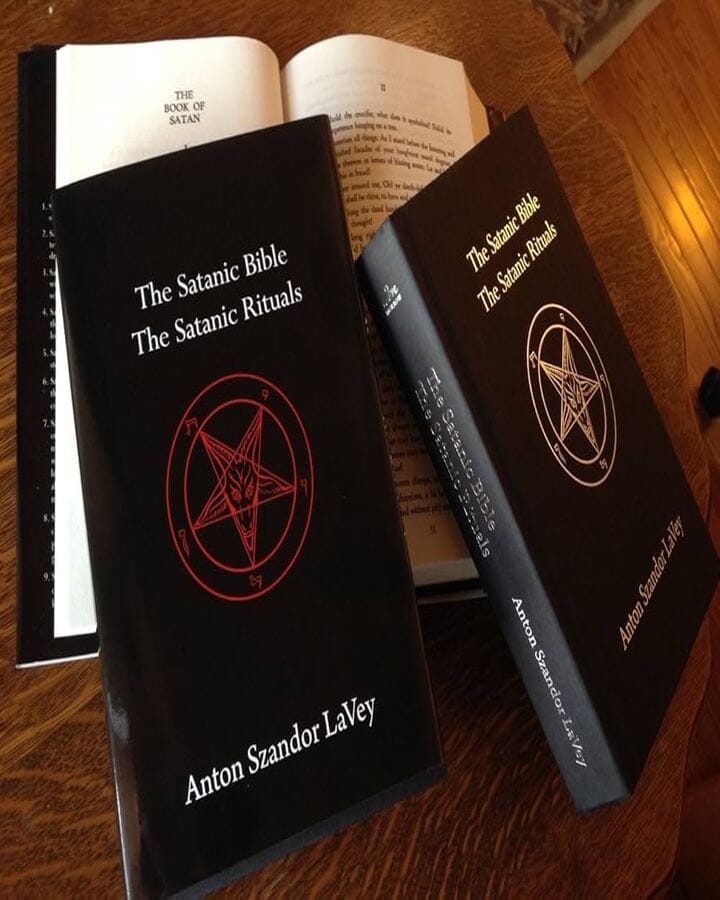
Image Credit – Hema
When Anton Szandor LaVey published The Satanic Bible in 1969, it became one of the most controversial and misunderstood books of the 20th century. The work marked the foundation of modern Satanism and established the Church of Satan as a legitimate religious and philosophical movement. While often associated with dark imagery and rebellion, the Satanic Bible LaVey is less about devil worship and more about human empowerment, individualism, and rational self-interest.
Satanic Bible Lavey

Who Was Anton LaVey?
Anton LaVey, born in 1930 in Chicago, was a musician, carnival performer, and occultist who later became a major figure in modern alternative religion. In 1966, he founded the Church of Satan in San Francisco, declaring it “Year One” of the Age of Satan. To LaVey, Satan was not a literal being but a symbol of human nature—representing pride, freedom, and personal power.
LaVey believed that traditional religions, particularly Christianity, suppressed natural human instincts through guilt and moral restriction. His philosophy offered a way for people to embrace their desires, emotions, and ambitions without shame. The Satanic Bible became the written foundation of his ideas.
What Is The Satanic Bible LaVey?
The Satanic Bible LaVey is a collection of essays, rituals, and philosophical ideas outlining the principles of LaVeyan Satanism. The book is divided into four main sections, each named after an infernal figure from various mythologies:
- The Book of Satan – A declaration of opposition to traditional religious hypocrisy. It encourages rebellion against moral oppression and promotes self-determination.
- The Book of Lucifer – Focuses on enlightenment and reason, discussing topics like love, hate, sexuality, and human behavior from a realistic perspective.
- The Book of Belial – Deals with the practice of magic and ritual as psychological tools rather than supernatural acts.
- The Book of Leviathan – Contains invocations and ceremonial texts designed to focus the practitioner’s willpower.
Together, these sections present a complete system of thought—one that celebrates individuality, self-control, and rational living.
The Core Philosophy Behind LaVeyan Satanism
LaVey’s version of Satanism is atheistic. Followers of the Satanic Bible LaVey do not worship Satan as a deity but use him as a metaphor for human strength, indulgence, and freedom from religious dogma. The philosophy is grounded in realism, logic, and self-empowerment.
Some key principles include:
- Self-Interest Over Self-Sacrifice – LaVeyan Satanism rejects blind altruism and teaches that helping others should come from genuine desire, not guilt or obligation.
- Responsibility to the Responsible – It values personal accountability and fairness but discourages aiding those who exploit kindness.
- Indulgence, Not Abstinence – The philosophy promotes enjoying life’s pleasures within reason rather than denying natural desires.
- Rational Selfishness – It sees self-preservation and ambition as essential human traits, not sins.
Through these beliefs, LaVey’s teachings emphasize personal power, emotional honesty, and intellectual freedom.
The Misconceptions Surrounding The Satanic Bible
Since its release, The Satanic Bible has been misunderstood by many. Some critics equate it with evil or criminal activity, but LaVeyan Satanism is not about harming others or promoting chaos. Instead, it encourages critical thinking and self-respect.
LaVey’s use of the term “Satan” was symbolic—a way to challenge the dominance of traditional morality and provoke independent thought. The Satanic Bible does not endorse violence, animal sacrifice, or supernatural worship. Rather, it celebrates the human spirit as powerful and complete in itself.
Cultural Influence and Legacy
The Satanic Bible LaVey has had a lasting impact on modern culture. It has inspired musicians, writers, and thinkers who value rebellion, individual freedom, and intellectual exploration. Bands from heavy metal to industrial genres have cited LaVey’s philosophy as an influence.
Beyond music, LaVeyan Satanism has also inspired discussions in psychology, philosophy, and ethics. Scholars view it as part of the broader humanist movement—an ideology that places humanity, rather than divinity, at the center of moral reasoning.
Even decades after its publication, The Satanic Bible continues to attract readers interested in alternative belief systems and self-empowerment. Its core message remains relevant: question authority, think critically, and live life fully.
The Satanic Bible LaVey is far more than a book about rebellion—it is a guide to self-awareness and independence. Anton LaVey used Satan as a symbol of freedom, reason, and human potential, challenging centuries of moral

Leave a Reply
You must be logged in to post a comment.